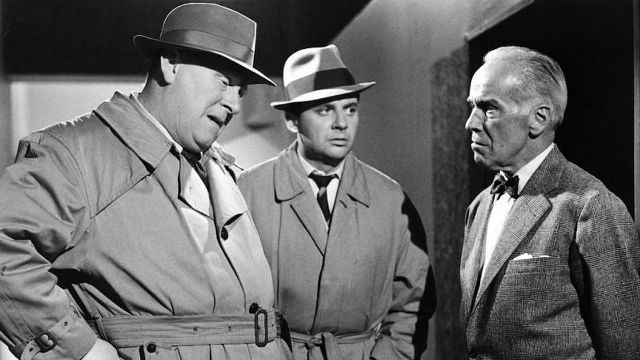The Testament of Dr. Mabuse (1933) 
“Fritz Lang’s Meisterwerk. Der Gewaltigste Film der Gegenwart.”

Director: Fritz Lang
Cast: Rudolf Klein-Rogge, Otto Wernicke, Gustav Diessl
Synopsis: A new crime wave grips the city and all clues seem to lead to the nefarious Dr. Mabuse, even though he has been imprisoned in a mental asylum for nearly a decade.
It’s tempting to draw parallels with the rise of Hitler’s Nazi party when watching Fritz Lang’s second examination of the operation of a ring of criminals mesmerically controlled by a master criminal. Sometime during WWII Lang even began claiming this film had been intended as a political parable. Lang, however, is known to have embellished the truth in order to establish somewhat self-aggrandizing myths about himself (there is a noticeable lack of evidence to support his famous claim to have been offered the role of director of the Nazi-controlled film industry by Goebbels, for example). Nevertheless, the gestures and body movements of the possessed Dr. Baum as he embarks on a rant about the genius of Mabuse over the arch-criminal’s dead body are eerily reminiscent of those used by Hitler when he was in full flow, and the anarchistic aims of Mabuse of absolute power through the spread of what he calls the absolute rule of crime (but which we would now recognise as acts of terrorism) can be viewed today as an allegory of the rise of Nazism.
The Testament of Dr. Mabuse, coming eleven years after the first Mabuse movie, almost plays like a compilation of one of those movie serials in which the hero finds himself in a perilous situation every twenty minutes – although, of course, Lang’s control over proceedings is far superior. The film is littered with car chases, assassinations, imperilled lovers trapped in a room filled with rapidly rising water, explosions, fires,gunfights etc, and yet, for all that, the pace is never too frenetic. Although this isn’t an expressionist movie, Lang toys with its conventions, most notably in its climactic car chase and a remarkable POV shot of Hofmeister’s insanity when Inspector Lohmann pays him a visit. This was only Lang’s second sound movie, and he makes better use of the noise of machinery and objects, as in the opening sequence, than with the actors. The tone is pretty melodramatic throughout, but the supernatural aspect, while a little incongruous in a crime movie, is well-filmed — especially in the scene in which the ghostly Mabuse hands a document to Dr. Braun.
As sequels go, this is pretty good, and is probably more aceessible to a general audience that the earlier silent Dr. Mabuse, der Spieler which, in its restored version, is nearly five hours long. The pace never lets up and Lang’s pet theme of redemption brackets the film in the characters of Hofmeister (Karl Meixner) and Kent (Gustav Diessl), both essentially good men driven to perform bad acts by circumstances beyond their control. Otto Wernicke reprises his role of Commissioner Lohmann from Lang’s earlier classic M to good effect and, while Rudolf Klein-Rogge has no words to speak, his commanding presence hovers over the entire proceedings. Good stuff.
(Reviewed 13th August 2005)
httpv://www.youtube.com/watch?v=n-WnY_ZmT9E
